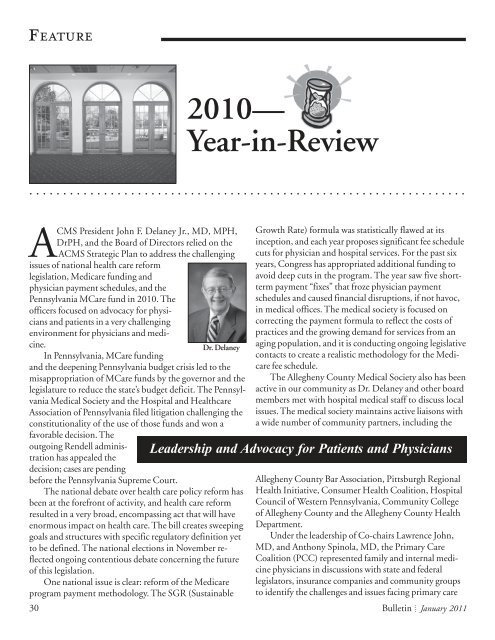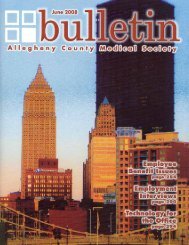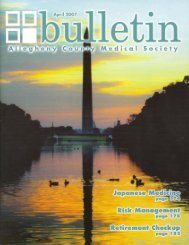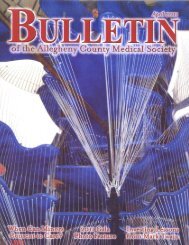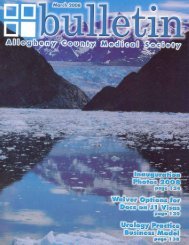○ ○ ○ ○ ○ ○ ○ ○ ○ ○ ○ ○ ○ ○ ○ ○ ○ ○ ○ ○ ○ ○ ○ ○ ○ ○ ○ ○ ○ ○ ○ ○ ○ ○ ○ ○ ○ ○ ○ ○ ○ ○ ○ ○ ○ ○ ○ ○ ○ ○ ○ ○ ○ ○ ○ ○ ○ ○ ○ ○ ○ ○ ○ ○ ○ ○FEATURE2010—Year-in-ReviewACMS President John F. Delaney Jr., MD, MPH,DrPH, and the Board of Directors relied on theACMS Strategic Plan to address the challengingissues of national health care reformlegislation, Medicare funding andphysician payment schedules, and thePennsylvania MCare fund in 2010. Theofficers focused on advocacy for physiciansand patients in a very challengingenvironment for physicians and medicine.In Pennsylvania, MCare fundingand the deepening Pennsylvania budget crisis led to theDr. Delaneymisappropriation of MCare funds by the governor and thelegislature to reduce the state’s budget deficit. The Pennsylvania<strong>Medical</strong> <strong>Society</strong> and the Hospital and HealthcareAssociation of Pennsylvania filed litigation challenging theconstitutionality of the use of those funds and won afavorable decision. Theoutgoing Rendell administrationhas appealed thedecision; cases are pendingbefore the Pennsylvania Supreme Court.The national debate over health care policy reform hasbeen at the forefront of activity, and health care reformresulted in a very broad, encompassing act that will haveenormous impact on health care. The bill creates sweepinggoals and structures with specific regulatory definition yetto be defined. The national elections in November reflectedongoing contentious debate concerning the futureof this legislation.One national issue is clear: reform of the Medicareprogram payment methodology. The SGR (SustainableGrowth Rate) formula was statistically flawed at itsinception, and each year proposes significant fee schedulecuts for physician and hospital services. For the past sixyears, Congress has appropriated additional funding toavoid deep cuts in the program. The year saw five shorttermpayment “fixes” that froze physician paymentschedules and caused financial disruptions, if not havoc,in medical offices. The medical society is focused oncorrecting the payment formula to reflect the costs ofpractices and the growing demand for services from anaging population, and it is conducting ongoing legislativecontacts to create a realistic methodology for the Medicarefee schedule.The <strong>Allegheny</strong> <strong>County</strong> <strong>Medical</strong> <strong>Society</strong> also has beenactive in our community as Dr. Delaney and other boardmembers met with hospital medical staff to discuss localissues. The medical society maintains active liaisons witha wide number of community partners, including theLeadership and Advocacy for Patients and Physicians<strong>Allegheny</strong> <strong>County</strong> Bar Association, Pittsburgh RegionalHealth Initiative, Consumer Health Coalition, HospitalCouncil of Western Pennsylvania, Community Collegeof <strong>Allegheny</strong> <strong>County</strong> and the <strong>Allegheny</strong> <strong>County</strong> HealthDepartment.Under the leadership of Co-chairs Lawrence John,MD, and Anthony Spinola, MD, the Primary CareCoalition (PCC) represented family and internal medicinephysicians in discussions with state and federallegislators, insurance companies and community groupsto identify the challenges and issues facing primary care30 Bulletin : January 2011
FEATUREphysicians and to develop policies that will improve theirprofessional lives and attract medical students to thesespecialties. The PCC sponsored a program exploring thepotential impact of the national legislation on primarycare physicians and also examined the Geisinger HealthSystems primary care network.The Primary Care Coalition worked with the Instituteof Politics at the University of Pittsburgh on a whitepaper on primary care. The group has helped createawareness of the shortages of primary care physicians andthe challenges presented to health care systems thatdepend upon them. It has also achieved fee scheduleincreases from carriers for primary care services.Executive Committee and Board of DirectorsThe ACMS Executive Committee and Board ofDirectors direct the medical society’s actions and providea forum for discussion for physicians, hospitals, insurancecompanies, business and legislative representatives. Theyhave worked tirelessly for the society and continue to beinvolved and supportive in community issues and organizations.During the past year, ACMS welcomed to itsboard meetings the following groups and individuals:• Christopher J. Olivia, president andCEO, West Penn <strong>Allegheny</strong> HealthSystem, presented a historical perspectiveof WPAHS, the health careenvironment in western Pennsylvaniaand his vision for the future of thesystem and associated physicians.• Highmark’s Bonnell G. Irvin, vicepresident of provider contracts &relations, and Carey T. Vinson, MD,January 2011 : BulletinDr. Oliviamedical director, quality improvement, discussed theQuality Blue Incentive Program for participatingphysicians and the impact of change in Medicare policyand payment for consultations upon private insurancebusiness.• Donald R. Fischer, MD, senior vice president, chiefmedical officer; and Atiya Abdelmalik, nurse manager,provided information on national health care reformlegislation and its impact on physicians and Highmark.Dr. Fischer noted that, while the legislation has passed,many of the provision’s details will be addressedthrough the development of regulatory policies, andthat there is a great deal of uncertainty regarding thespecifics of the majority of the issues contained in thelegislation.• Wellspring Worldwide’s RobertLowe, CEO, and Brian Bricker,vice president, provided informationon their company’s SEEDprogram. Wellspring Worldwide, aglobal leader in technology commercializationthat works ontransforming research and creativeideas into successful products, isfunded by Pittsburgh-based foundations to developentrepreneurs in technology in the Greater Pittsburgharea. The SEED Program (Services for Entrepreneurshipand Economic Development) provides individuals andemerging companies with support and resources inbusiness planning, engineering and development,product design and usability testing and infrastructure.One area of expertise is in health care informationtechnology.• A. J. Harper,HospitalCouncil ofWesternPennsylvaniapresident,discussed theMedicare WageIndex and itsimpact onWesternPennsylvaniaand the paymentdisparityamong medicalMr. BrickerA. J. Harper HCWP president (l.) and Dr.John F. Delaney, ACMS presidentassistance payments between hospitals in eastern andwestern Pennsylvania. The hospital council covers 32counties in Western PA. Mr. Frederick Peterson, hospitalcouncil vice president, professional services, disasterpreparedness, discussed West Penn <strong>Allegheny</strong> HealthSystem’s restructuring of clinical services and its possibleimpact on the community. He also noted the ongoingdisaster preparation and emergency planning beingconducted by the hospitals, as well as work on theMedicare Wage Index project.• Dr. David Perlmutter, chair of the department ofpediatrics at UPMC and a pediatric gastroenterologistat Children’s Hospital of Pittsburgh, outlined what hecalls health care’s biggest challenge, here and in thecontinued on page 3231


